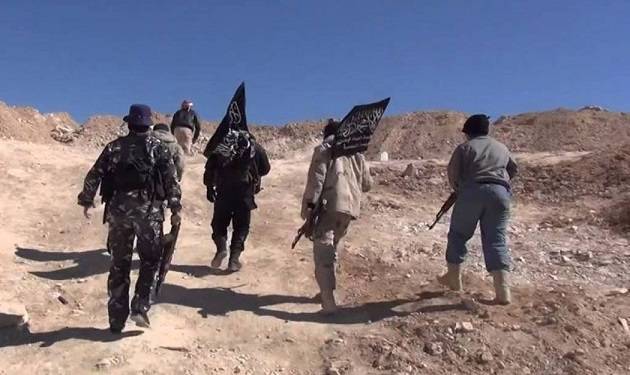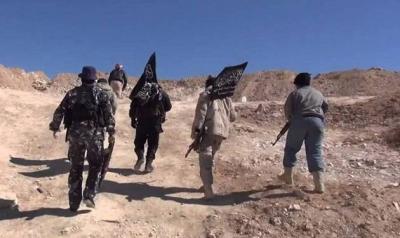Under the title "A New Theater for ISIS Terrorism: 'Malicious Targets' and a Fertile Environment for Its Activities," Sky News Arabia published a special article about ISIS. Following the severe blows it suffered in recent years, the terrorist organization has been attempting to restructure and rebuild its bases, adopting a repositioning strategy that focuses on vulnerable points experiencing specific conditions that provide a fertile ground for its activities. The African continent is considered one of the primary launch points in the organization's strategy, as evidenced by recent operations by ISIS and its affiliated groups in sub-Saharan Africa.
A recent study from the Ma'at Foundation for Peace and Development in Cairo revealed that in 2020, the continent witnessed over 525 violent incidents affecting 27 African countries, resulting in at least 7,030 fatalities. This comes as the organization seeks to exploit opportunities in the Arab region as well, carrying out retaliatory operations to bring itself back into the limelight. Statistics have shown that ISIS was responsible for 46 terrorist operations out of a total of 169 that occurred in Arab countries during the first three months of 2021, making it the leading organization behind terrorist attacks in that period, closely followed by Al-Shabaab with 43 operations.
Strategic Dynamics
Egyptian strategic thinker Major General Samir Farag stated in exclusive comments to Sky News Arabia that there are areas where the organization has shown significant activity, particularly in Africa, while also highlighting other regions where the group is in a "latent phase," such as its status in Egypt. He notes that terrorism in Egypt is in a "latent phase" following the blows received that managed to cut the roots of terrorism, targeting leadership, centers of terrorist organizations, their cells, weapon depots, and funding channels. Consequently, following such assaults, groups like these tend to enter a period of dormancy, seeking to reprepare themselves and their plans. "Thus, we should not be deceived into thinking that the low number of terrorist operations in Egypt indicates a lack of threat; at any time, these groups could attempt to carry out new operations," he warns.
Regarding other Arab regions where ISIS is active, Farag points out that the organization has strengthened its presence in areas where insufficient efforts have been made to eradicate it, relying on the past defeat inflicted upon it. Consequently, ISIS has begun to fortify itself and restore its arsenal and weaponry, executing new operations targeting some of these countries as part of its renewed movements.
A Constant Danger
Among the reasons for the increase in ISIS operations in certain countries are the crises and internal conflicts they experience. According to the study, it is likely that ISIS will seek to capitalize on the lack of apparent solutions to end these conflicts, launching more operations in the second quarter of the year. Additionally, extremist groups expert Khaled Al-Zafarani asserts that ISIS will continue to pose an imminent threat to the region, and it cannot be said that it has been vanquished, especially given the ongoing factors creating a fertile environment for the organization’s growth in Africa, particularly in countries experiencing internal strife.
Al-Zafarani explains that the persistent political and security instability in these countries, alongside chaos, continuously fuels the ISIS threat. "The group's ideas in those countries remain active, and its followers continue to pose a danger, as the conditions that spurred its growth still exist. Therefore, all these factors encourage the resurgence of ISIS in alignment with its repositioning strategy."
Terrorism and the Pandemic
Despite COVID-19, terrorist organizations have exploited the pandemic to their advantage. A study titled "Lens of Terrorism in Africa" indicated that "the global health crisis and the diversion of governments toward mapping out plans to reorganize their situations amidst economic contraction have created a fertile environment for the growth of terrorist and extremist activities. Extremists have regarded the health crisis as divine punishment. Moreover, terrorist groups have taken advantage of the spread of the disease and the preoccupation of governments not only to expand their extremist activities but also to enact government-like roles in some regions of the continent."
Professor of Strategic Sciences in Cairo, Major General Nasr Salem, highlights that these terrorist organizations view Africa as a suitable environment for their operations due to the surrounding poverty and conflicts in certain countries. Thus, the continent aligns with the organization’s strategy for restructuring and building up its bases, which is reflected in the scale of terrorist operations witnessed in various African countries over the past year.
He also points out that the region has undergone many pivotal changes that directly impacted ISIS, which has strived to enhance all its tools and strategies to rebuild itself and renew its activities on a larger scale, launching from the dynamics of these organizations and their persistent quest to find a place to recuperate their recent losses. The organization is exploiting all favorable conditions for this, which has led to a significant focus on Africa. ISIS utilizes security laxity and the growing political and sectarian conflicts to carry out these operations, resulting in numerous civilian casualties.




